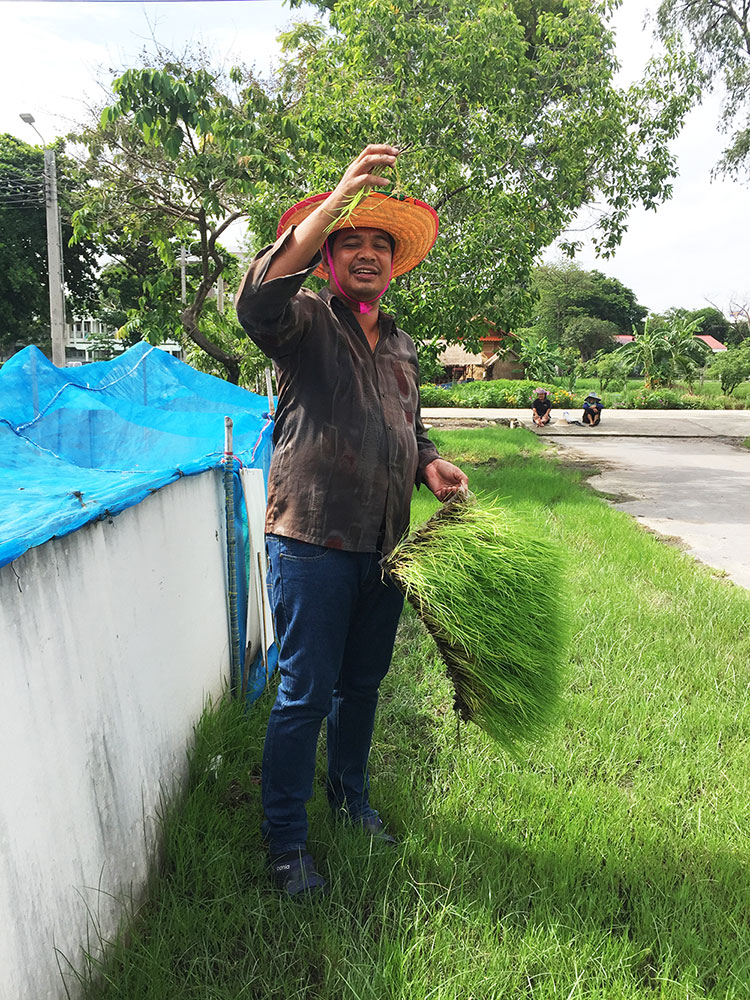
Writer: Agriculture and Food Cluster Team
Healthy rice production is vital not only for farmers, but also its daily consumers. So, why is it that this industry faces innumerable challenges?
Imagine a hot and humid day. With the sun glaring into your eyes and sweat dripping from your forehead, you’re working extremely hard out in an open field giving your all in order to make sure the crops grow healthy. This is a normal day in the life of a rice farmer. Now imagine losing a majority of your produce due to crop failure, or not being paid enough for all the hard work you put in. This, unfortunately, is also a fairly common reality for a majority of rice farmers.

Since rice is a staple food for more than half of the world’s population, it is crucial that the rice production industry is given a high priority. Rice farmers around the world face innumerous challenges that obstruct them from succeeding in growing healthy crops. Although rice is a prevalent crop which is easily available almost everywhere, its growing process, on the contrary, is not that facile.
For example, it is estimated that in order to grow 1 Kg of rice, around 800 to 5,000 Liters of water is required. This fact alone gives us an idea of the struggles that are faced by rice farmers in order to grow healthy crops. Most of these farmers are poor, therefore, it is not surprising that most of them are unable to afford such facilities, in spite of receiving subsidies from the government. Their cost of production turns out to be much more than the price they receive after selling the crops.
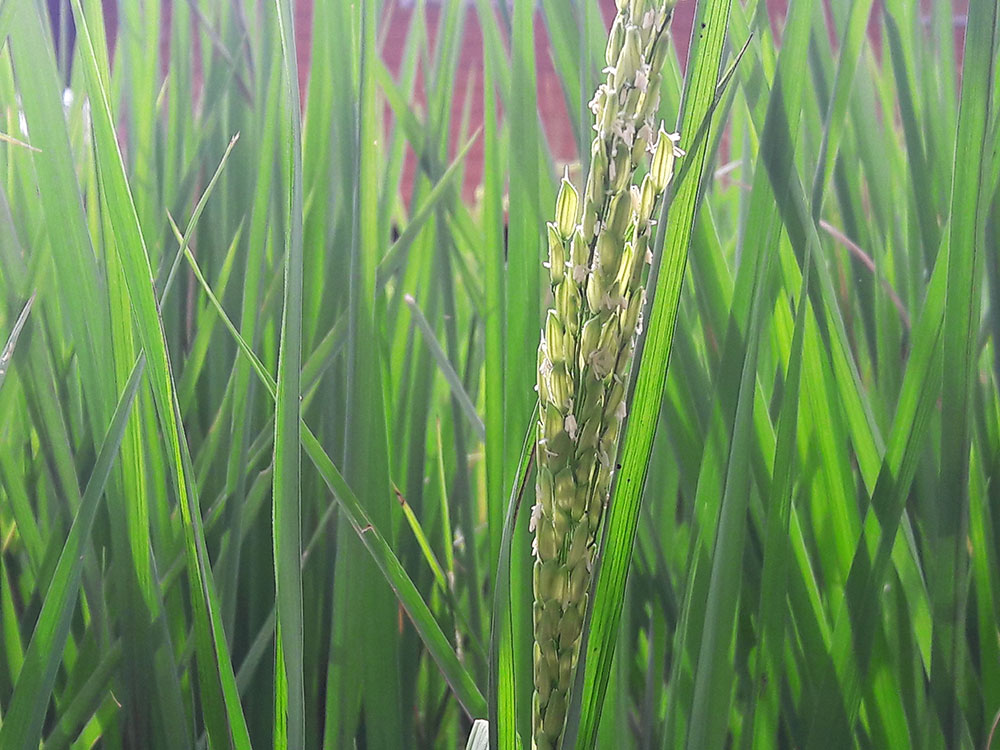
During the trip to a demonstration rice field at Rice Department in Bangkok, we found out that a lot of crop failures occur due to the farmers using the wrong combination of fertilizers due to lack of knowledge, as they don’t have the resources to analyse the soil and nutrient requirements. This, combined with many other issues, contribute to the degradation of rice farming, which, on top of having a direct impact on the farmers, also indirectly affects the consumers. Therefore, it is essential that sustainable rice farming is adopted by this industry.
If following sustainable farming practices is the ultimate solution that helps increase rice productivity, why is this industry still not flourishing enough? One of the main reasons behind this is the skepticism received by these practices from the rice farmers. These are non-conventional ways that somewhat differ from the ‘conventional ways’ of farming that these farmers are taught at a young age. Therefore, a majority of these farmers refuse to adopt such practices. Furthermore, most of the sustainable practices include the use of expensive equipment, and even though it is subsidised by some of the governments at the start, these subsidies start decreasing in amount as time progresses, thus emptying the personal pockets of farmers.
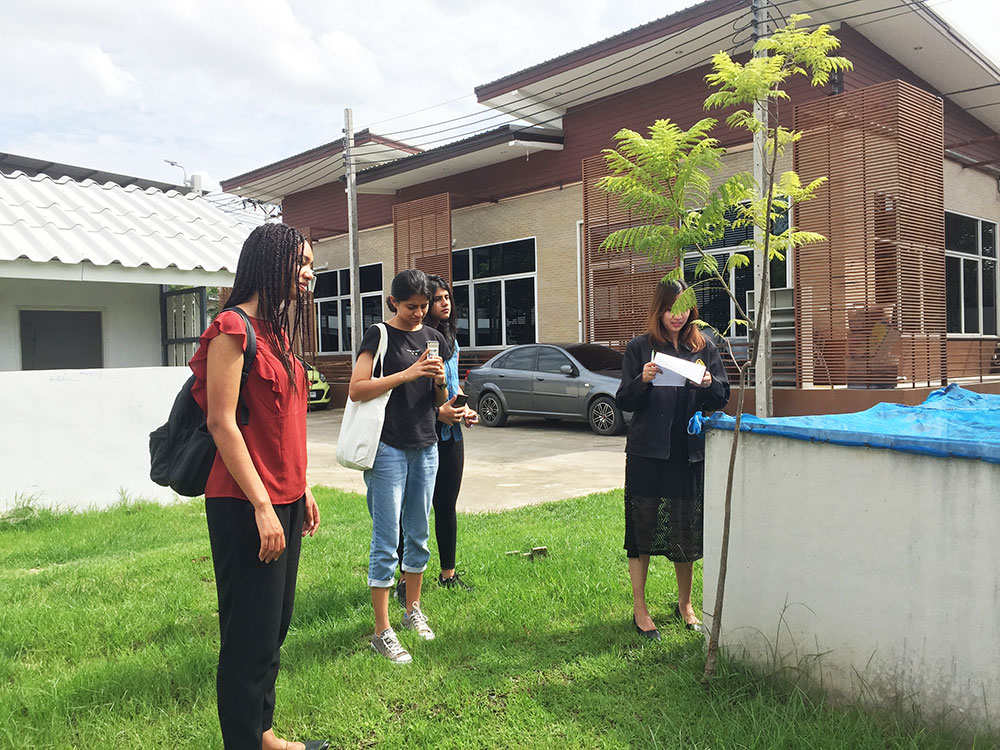 NIST students during the Work Experience Week with GIZ
NIST students during the Work Experience Week with GIZ
However, according to Ms. Wannipa Soda, a Soil and Nutrient Management expert, these sustainable techniques, which although seem like an expensive approach at first, turn out to be cost-beneficial and also produce a higher quantity of healthy crops in the long run. The trip to the demonstration field also made us aware of the fact that the crop yield obtained from these sustainable ways in the long run would be so much better, that the financial loss incurred in the beginning would be canceled out. Therefore, an investment of money as well as initiative is required in order to bring these sustainable methods into practice, and thankfully, there are some organisations that work towards this goal.

One of such organisations, Deutsche Gesellschaft für Internationale Zusammenarbeit, better known as GIZ, is an organisation that is based on the vision of working to “shape a future worth living around the world”. One of their projects, the Better Rice Initiative for Asia (BRIA) has the goal of helping farmers in ASEAN countries to convert to sustainable practices for growing rice. It is important to do so, especially in Southeast Asia, as it is known as the ‘kitchen of the world’. The sustainable methods will result in using less water, less fertilizer and chemicals, and overall a more healthy soil base. The benefits of being sustainable not only helps to preserve the environment, but also impacts people’s health, as well as generating a 25 per cent net worth profit for farmers. The farmers are supported with the implementations of sustainable production technologies and practices, and are also educated on how these practices are beneficial for them. They also make sure that the crops produced meet the Good Agricultural Practices (GAP) and Organic Agriculture food standards that are adopted by ASEAN for fruits and vegetables.
Even though organisations like GIZ try their best to bring about a change, there are many obstacles in their way that obstruct them from doing so, one of the main ones being the farmers’ unwillingness to change their ideologies about farming practices. Since most of the rice farmers are elderly (55 years and above), they are used to follow specific sets of farming practices their whole life, which makes them skeptical about the new sustainable techniques.
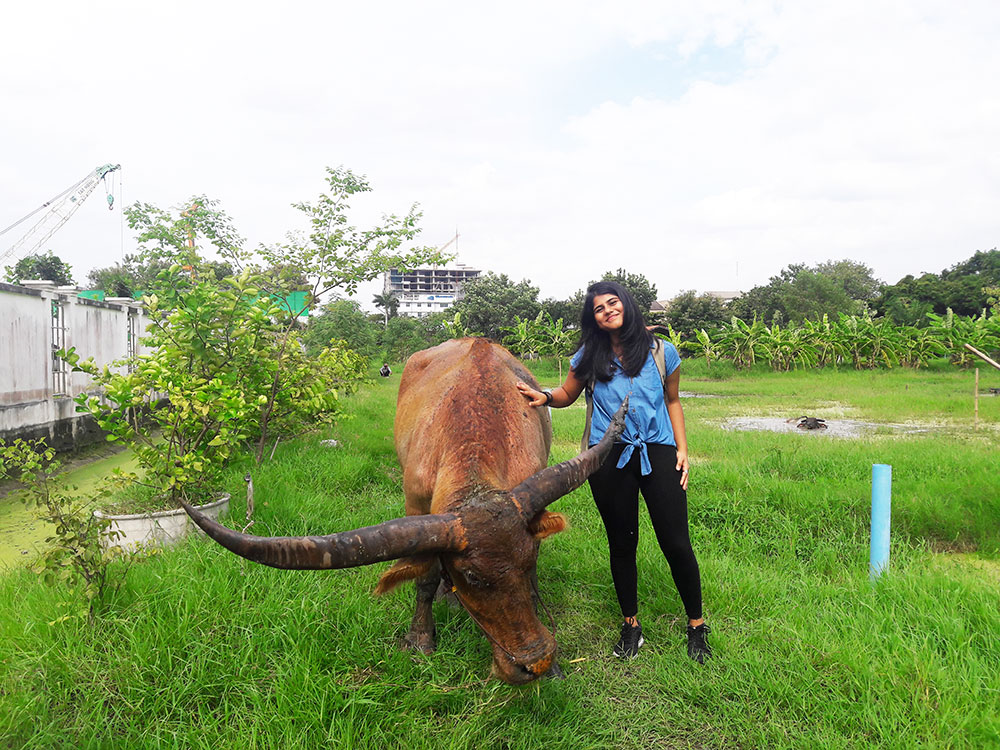
This indicates another issue that hinders the growth of sustainable rice farming, the lack of young rice farmers. The insufficiency of young farmers is unfavourable in two main ways. Firstly, a combination of their strength and sharp minds work incredibly well out in the field. Secondly, teaching the benefits of adopting sustainable practices to young minds from the start helps in shaping their ideologies about healthy farming practices, which stays with them for life. Therefore, when these educated young farmers take up the role of a farmer, they are more likely to adhere to the sustainable farming practices as they will be well-educated on the benefit of sustainable rice farming from the start.
However, the number of young people taking up this profession is decreasing. According to Ms. Julmanee Pithuncharurnlap, Director of Rice Production Extension Bureau at the Rice Department in Thailand, the youth is reluctant to join this profession mainly because of the generation gap, as they think that being a farmer is too much hard work and also provides with a low income. Nevertheless, there are programmes that intend to solve this problem.
A project named ‘Young Smart Farmer’, initiated in Thailand, is a programme that aims towards getting young farmers interested in this profession. They provide a number of resources to farmers in order to increase their knowledge on healthy farming practices. They have set up School Rice Learning Sectors in various provinces, where around 40-50 students from each school that belong to a farmer’s family are educated about the rice-growing practices and their families’ traditions. They are made aware of the various improved farming practices for better production, which is something that can also be shared with their parents. They are informed about the benefits of integrating technology with traditional farming techniques, one of them being the introduction of E-market, where the social media can be used to increase sales. The main motivation behind all of this is to motivate young people to work in the fields, or instead, work in the managing sector, if they resent the physical work in the field.
Along with programmes like these, schools are also doing their best to spread awareness about the importance of sustainability. An exemplar school that does just that is NIST International School of Thailand. NIST has set up a rooftop garden that is accessible to all, from kindergarten students learning about a plant’s life, to secondary students observing the fundamentals of an aquaponics system. Compost used for the garden is provided by none other than parents, students and staff themselves, where they are allowed to dispose of their food items in a collective box. The plants grown in the garden are then sold to the public at NIST. A few other ways NIST promotes sustainable eating is by introducing food items that are made utilizing sustainable practices in the cafeteria. For example, sausages at NIST are provided by Sloane’s artisan, a company that breeds free range pigs that eat healthy and appropriately. Eggs used in the cafeteria are organic, and so are packets of coffee, which was set up by a service group lead by a group of students to promote fair trade coffee production.
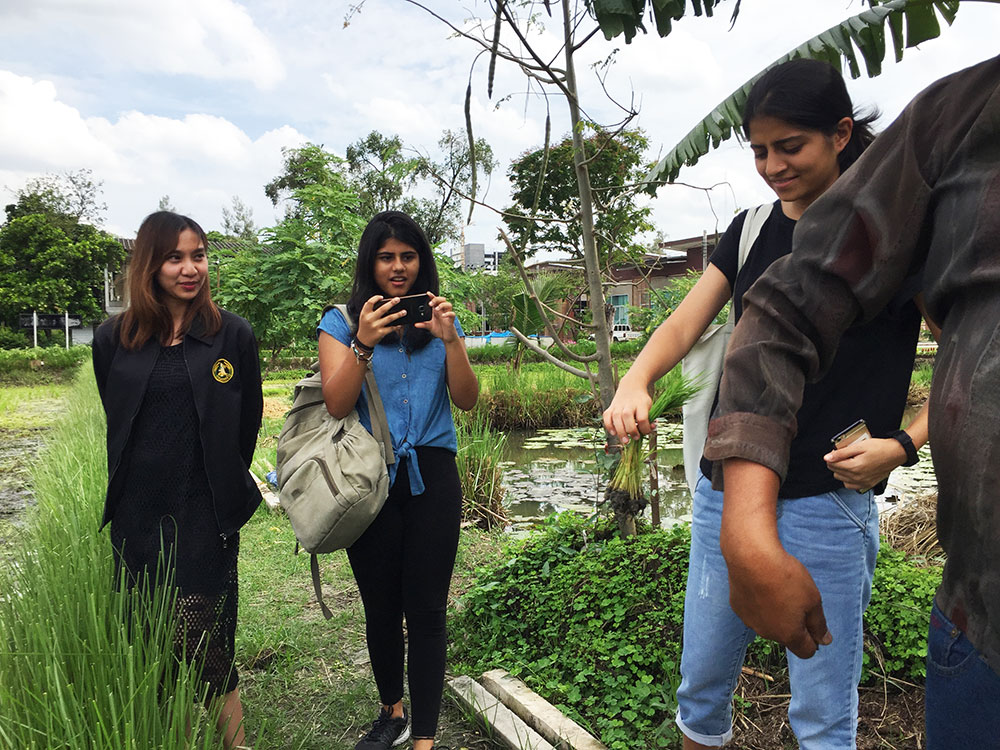 NIST students get their hands on experiences at the demonstration field
NIST students get their hands on experiences at the demonstration field
All of these initiatives, however, are taking time to show their effect. In order to preserve this world from further damage, its people need to work together to come up with sustainable alternatives to harmful conventional methods. To do this, people’s mind-set have to be changed in terms of identifying a problem and thinking of innovative solutions to approach the problem, instead of continuing the conventional way because of its reliability and familiarity. Risking the standard way of agriculture is what farmers and corporations are willing to do for the better of this world, it’s people and it’s future. But it’s up to you to initiate the movement of change, as the only way a product can succeed is if there are consumers for it.
By Anna (Anahita) Sharma and Hansa Mirpuri, NIST International School of Thailand
GIZ had hosted two student from NIST International School of Thailand during the NIST Work Experience Week for Year 11 students from 9 June to 15 June 2017. The NIST programme was designed to offer students the opportunity to gain a broader understanding of the world of work as part of their education.
This writing piece was written by the students as the conclusion of their experiences during the five-day period with the Better Rice Initiative for Asia (BRIA) project. BRIA is a sister project of ASEAN Sustainable Agrifood Systems project.
